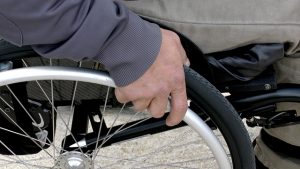Adventures in Internalized Prejudice
A few months ago, I went to a signing and Q&A at my local comic book store. As soon as I entered the store I saw him, but I pretended that I didn’t.
He sat in a power wheelchair, and was talking with friends who stood around him. Maybe he had cerebral palsy? I felt uncomfortable knowing the store would have to think about making accommodations in their seating arrangement. Who knows what other special needs he may have?
 I went to go find my own place to sit. I preferred not to be near a wheelchair section.
I went to go find my own place to sit. I preferred not to be near a wheelchair section.
One of the reasons I came to be a fan of this comic book—Monstress, by Marjorie Liu and Sana Takeda—was because of its representation of diversity in race, gender, and sexuality, but also disability—in ways that don’t feel tokenizing.
Because… I have cerebral palsy and use a power wheelchair.
And because quality portrayals of disability in any media are few and far between.
Yes, I went to an event to celebrate disability inclusion, and I was avoiding other disabled people. The irony took a minute to set in.
So why was I instinctually avoiding this guy? This person with whom there were immediate, obvious connections? I’m used to having the only wheelchair in the room. It makes it easier, somehow. I can attempt to minimize my needs and impact on able-bodied people in a way that I can’t otherwise. I think I try to minimize those things in my own mind, as well.
I wasn’t really seeing him, and I was hesitant to do so. I was afraid of seeing myself reflected in him, and not liking what I saw. An out-turned foot, a clenched hand, messy hair; anything that might suggest inability or incompetence. Because aren’t those the hallmarks of disability?
I didn’t want to be reminded of what I think everyone else sees: something different, incapable, something to make room for, to be accommodated, something unproductive, nonsexual, unintelligent, unvaluable, something to inspire you and help you appreciate your privilege, some thing. These are the messages I have gotten from society since I was a child. Both in the ways people like me have been portrayed in media, and the ways we are not portrayed.
I can forget that I represent all of that to society when I am the only. This is also why I have largely shied away from disability community in general. Even though I have made progress in unpacking and letting go of the shame surrounding my disabled identity, it can still hard for me to recognize other disabled folks as people to join and identify with.
And unfortunately, the more connected I am with other disabled people in my surroundings, the less integrated I feel with everyone else. Wheelchair sections and other accommodations that are ostensibly meant for inclusion are in fact isolating. Separate has never been equal.
As people were getting settled in their seats, the gentleman pulled up and sat beside me. I smiled politely, and we struck up a conversation. It turned out we had both gone to UC Berkeley. Also, we were both comic fans (surprise!) and liked Monstress for similar reasons. He had written to the author, and decided to write her as well after this event.
He had been on a creative team that wrote a comic book about a disabled superhero; he wants to write another where the hero’s personal attendants are also the crimefighting support team. That was a concept that hadn’t occurred to me, but I could immediately see the potential in it: I have my own dreams about creating a comic that would include a disability perspective.
As we talked, I noticed our similarities, and was mostly aware of how much I didn’t have to explain to him. It took only a few moments for me to appreciate him. This was someone I could see being friends with, and there was a potential for creative collaboration. We both asked questions of the Monstress author pertaining to disability, and I felt pride that we both were representing our flavor of diversity.
My internalized prejudice tells me to fend for myself, not to impose on others, not to get noticed, and perhaps most of all that people like me shouldn’t be associated with.
None of these are possible or even enjoyable. Nor do they encourage my success in any way.
It’s a long journey to unlearn what you have been taught about yourself, and ironically, you can’t do it alone. And so when we find ourselves together in elevators, wheelchair sections, etc., will we awkwardly try to distance ourselves, or will we discover and support our common experience?
